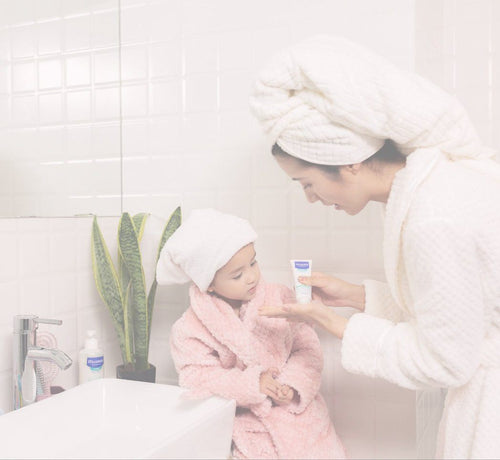You may have heard about eczema, but if you or your child is now face-to-face with this skin condition, you’re probably asking yourself, “What is eczema anyway?” That’s one of the questions we’ll answer in this article. But we won’t stop there.
To help you get a handle on this skin condition, we’ll also go over the causes and triggers of eczema, symptoms, and (most importantly) how you can treat and manage it.
So, first up: What is eczema?
What Is Eczema?

“Eczema” is a broad term and there are several types. But, in this article, we will focus on one: atopic dermatitis. From now on, when we use the word “eczema,” this is the type we are referring to.
The short story is that eczema is a skin condition that can affect babies, children, and adults and shows up as red (or yellow), swollen, and itchy skin.
Baby eczema may go away by the time your child is a teen, but eczema can also be a chronic condition that will need to be managed throughout adulthood.
The red, itchy skin of eczema is the result of a compromised skin barrier. This natural hydrolipid barrier is designed to protect your skin from outside invaders and irritants while at the same time keeping needed moisture in.
When this protective layer is not functioning at 100%, your skin is susceptible to irritants. That said, the exact cause of eczema and its weakened skin barrier is a bit of an unknown. Let’s talk about that.
Causes Of Eczema

As we just mentioned, a compromised skin barrier is the reason for the sensitive, easily irritated, itchy skin of eczema sufferers. But what is the root cause behind all of this? Even doctors aren’t completely sure.
It’s thought to be a combination of genetics, dry skin, an autoimmune condition, and environmental factors.
That brings us to an important point. While we could go on wondering about the causes of eczema, we’ll move on to what you can know and (to some degree) control: triggers. Triggers are what make eczema worse or contribute to a flare-up.
Each person’s skin will be sensitive to different irritants, but here are a few things that can trigger an eczema flare-up when combined with your delicate, compromised skin.
- Dry skin
- Heat
- Cold, dry air
- Air pollution
- Food allergies
- Pet dander
- Tight clothing
- Wool and polyester
- Soap
- Dust
- Fragrance
- Laundry detergent
- Shampoo
- Cleaning products
- Stress
If you haven’t been diagnosed with eczema but think that’s what’s going on, we’d encourage you to see a dermatologist. Until then, we’ll go over a few of the symptoms of this condition so you know what you’re looking at.
Symptoms Of Eczema
The symptoms of baby eczema and adult eczema are pretty much the same: itchy skin, dryness, irritation, swelling, rough skin, or red patches (that may ooze slightly). Keep in mind that symptoms can vary from person to person.
Another thing to remember is that the location of this condition can change as your baby grows. Baby eczema often appears on your little one’s face (though it could be anywhere) and moves to other areas of the body as they grow.
Kids five years or older typically experience flare-ups only on their hands or the insides of their elbows and knees.
To learn more about eczema, take a look at this video by Board Certified Pediatric Dermatologist, Dr. Latanya Benjamin.

If you know that you’re dealing with eczema-prone skin, there’s no need to wait to start skin-soothing treatments!
Natural Eczema Treatment
The unfortunate news is that there is no cure for eczema. Instead, managing the itch and avoiding flare-ups is the name of the game.
You should know that there are over-the-counter and prescription medications available, like corticosteroid cream, antibiotic cream (in the case of infection), and oral corticosteroids.
However, long-term application of these medications — steroid creams, in particular — can be dangerous. You’ll also need to be extra careful in the sun when using steroid creams
Because of this, many people are interested in managing eczema naturally — without the use of medication. If that’s you, you’re in the right place. While you should still speak with your doctor, here are several ways to naturally care for your eczema-prone skin on the regular.
Stop Scratching
Stop scratching. We know that this is much easier said than done. Just remember that scratching or rubbing may provide a second of relief, but it only serves to irritate your skin and make the situation worse in the long run.
To help you stop scratching, keep your and your baby’s fingernails short and clean, and consider wearing cotton gloves at night because you may not even know that you (or your little one!) are scratching in your sleep.
Be Careful What You Wear
Those that suffer from eczema-prone skin (both children and adults) are sensitive to polyester and synthetic fabrics, as these are more likely to cause you to warm up and sweat, which leads to more itchiness.
Choose loose, cotton clothing when possible to avoid this situation. We recommend dressing your little one in our Stelatopia Skin Soothing Pajamas. Using microcapsule technology, these 100% cotton pajamas deliver skin-soothing moisture to the skin throughout the night.
Learn more about the best way to dress your eczema-prone baby here.
Avoid Allergens And Triggers
Avoiding allergens, irritants, and triggers is one of your most important tasks! While there’s no foolproof way to avoid eczema flare-ups (they happen to the best of us), avoiding triggers is one of the key steps.
Of course, in order to avoid irritants, you’ll have to know what your particular triggers are. Refer back to the triggers that we listed in the “Causes Of Eczema” section and pay close attention to your skin to keep track of how it reacts to your environment.
Manage Stress

As strange as it may seem, stress can be another trigger for eczema. Remember that your whole body is connected!
We know that it’s impossible to remove all stress from your life. But do what you can to cut down on stressful situations and learn coping and calming techniques to deal with anything else that comes up.
Your doctor or a therapist can help with this.
Choose Natural Ingredients
With sensitive, eczema-prone skin, you’ll want to choose your skincare products carefully. This means opting for as many natural ingredients as possible and steering clear of synthetic, chemical ingredients that can be quite irritating to your skin.
Think about your facial cleanser, lotion, soap, sunscreen, shampoo, conditioner, and even laundry detergent and fabric softener. For little ones, you’ll also need to consider baby wipes, bubble bath, baby shampoo, diaper cream, and the like.
What should you stay away from? Synthetic fragrances, parabens, phthalates, and phenoxyethanol, just to name a few.
Instead, choose products that are crafted with ingredients that are derived straight from nature and are specifically designed to soothe and calm eczema-prone skin. We’re talking about ingredients like avocado perseose and sunflower oil distillate, which are two of our favorites.
Take A Therapeutic Bath

A long soak in hot bathwater can do a number on eczema-prone skin. But if you do your bath the right way, it can help, not harm, your skin. Keep baths short — 10 to 15 minutes — and lukewarm, rather than hot.
Using an eczema-friendly bath oil is a great option. For little ones (or for yourself!) we recommend running a lukewarm bath and adding a small amount of Mustela’s Stelatopia Cleansing Oil.
This multi-use oil is designed for extremely dry and eczema-prone skin and envelops itchy skin in a silky, hydrating barrier. The best part? It’s composed of 98% naturally derived ingredients and is certified by the National Eczema Association.
Moisturize Your Skin

Moisturizing is one of the best ways to protect and calm your skin as well as help prevent flare-ups. Just be sure that you are using a gentle, natural moisturizer that will do good, not harm! As we mentioned, the right ingredients are key.
For little ones as well as yourself, turn to our Stelatopia Emollient Cream, Stelatopia Intense Eczema Relief, and Stelatopia Emollient Face Cream which are moisturizers made with eczema-prone skin in mind!
With a light texture, these creams are perfect for everyday moisturization and help soothe discomfort, relieve itching, and reinforce the skin’s moisture barrier, too.
Plus, they’re fragrance-free and made with naturally derived ingredients like avocado perseose (a patented nutrient that helps protect delicate skin) and sunflower oil distillate, a natural ingredient that soothes and replenishes skin.
Run A Humidifier
Dry air zaps the moisture out of your skin. You can’t do anything about the weather outside, but what you can do is run a humidifier in your home to pump some moisture into the air. More moisture in the air means more moisturized skin.
Apply A Cold Compress
Even with the best skin care, you may still end up with swollen, red, itchy patches of skin. For some immediate relief, apply a cold compress. This can simply be a cool, damp towel — no need to get fancy.
Submerge the towel or washcloth in cold water and wring it out before placing it on the affected area.
Watch For Signs Of Infection
In addition to managing your symptoms and keeping the itch at bay, you’ll want to keep an eye out for signs of a skin infection. This could be crusty skin, pus-filled blisters, pink or red streaks on your skin, or feeling sick overall.
Note: Be cautious about adding creams, balms, and lotions to open or oozing skin. And if you have any concerns about what’s going on with your skin, give your doctor a call.
Manage Your Eczema The Natural Way

What is eczema? Hopefully, this article has answered this question and others that you might have about this common skin condition. While the exact cause is a bit mysterious and symptoms can vary from person to person, you can manage your eczema naturally using the tips in this article.
Avoid triggers, scratching, stress, and chemical ingredients that could be irritating to your skin. Instead, choose natural products like Mustela’s Stelatopia Emollient Cream to soothe and protect your skin.
With the right skin care day in and day out, you can rest assured that you’re doing everything you can for your delicate, sensitive skin.








